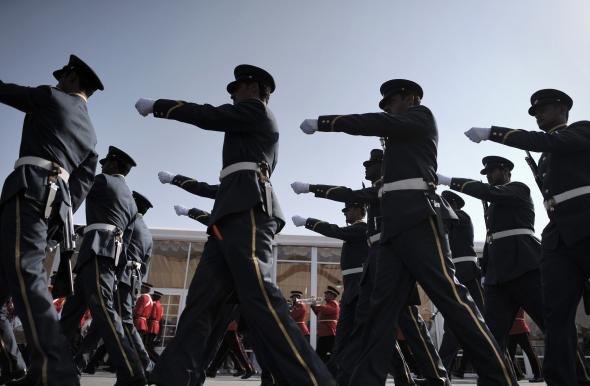The U.S. State Department today announced that it is lifting restrictions on military aid to Bahrain, which were put in place after the government crackdown on protests during the 2011 Arab Spring. The U.S. will once again provide anti-tank missiles and Humvees, and the Bahraini government will now be able to request additional arms. It was probably only a matter of time. Bahrain is home to the U.S. Navy’s Fifth Fleet and supports the U.S.-led air campaign against ISIS in Syria, which included the Royal Bahrain Air Force’s first-ever combat missions.
But the move comes despite continuing criticism of the Gulf kingdom’s human rights practices, particularly its crackdown on Shiite political activists following the 2011 protests, which were put down with the help of Saudi troops, with dozens killed and hundreds injured. The State Department’s own country reports on human rights, released last Friday, faulted Bahrain for practices including the “arrest and detention of protesters (some of whom were violent) on vague charges, occasionally leading to their torture and mistreatment in detention; and lack of due process in trials of political and human rights activists, students, and journalists, including harsh sentences.” The report also noted that the high-ranking officials involved in the violence against protesters have mostly gone unpunished and that “discrimination continued against the Shia population, as did discrimination based on gender, religion, and nationality.”
Tensions reached a high point last summer when Bahrain expelled U.S. Assistant Secretary of State Tom Malinowski after he met with members of a Shia opposition group. Malinowski returned to the country last December.
The Obama administration has been gradually backing away from the restrictions placed on assistance to autocratic Arab regimes, whose support is seen as vital in the ongoing campaign against ISIS and other extremist groups. The administration resumed assistance to Egypt—the world’s second-biggest recipient of U.S. military aid, after Israel—in March, having suspended it following the coup that overthrew democratically elected President Mohamed Morsi in 2013. That decision was made despite little evidence that human rights conditions have improved in Egypt. An Amnesty International report released Tuesday charges Egypt with imprisoning a “generation of young activists” in a crackdown on dissent that has seen more than 41,000 arrests and hundreds of death sentences, including for Morsi himself.
